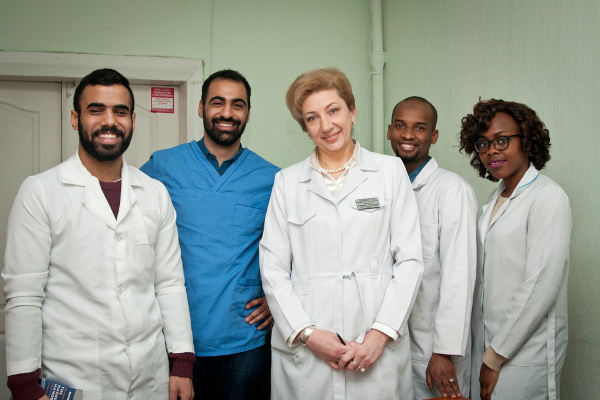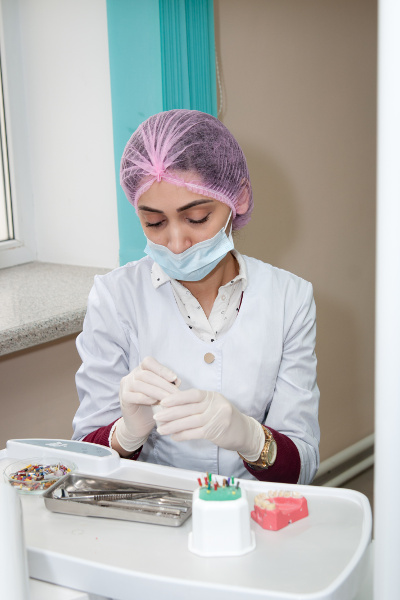Nursing Faculty

The aim of the Bachelor’s Degree program in Nursing at Kharkiv National Medical University is to educate registered nurses to assume professional responsibilities working closely with the patient. Nurses must have good communication skills and be able to take part in developing healthcare. Course of Nursing focuses on extensive study of nursing theory and practice and training in clinical skills.
The Bachelor of Science in Nursing program at Kharkiv National Medical University lasts two academic years and 10 months in English language. It follows the Bologna scheme and prepares future healthcare specialists to professional practice in the broadly defined discipline of nursing.
Students in the Nursing Bachelor Degree program gain the theoretical, practical, and personal knowledge and skills that are required to meet and take care of people who are in need of attention. Students get to take part in simulated modules that replicate real-world scenarios in order to gain practical skills.
A Bachelor Degree in Nursing from Kharkiv National Medical University supplies students with all the basic nursing skills. The curriculum covers theoretical and practical aspects of nursing, encompassing the following areas: health promotion, preventive health care, health education, and – most importantly – a broad scope of treatment, rehabilitation and nursing procedures.
Topics of study in the Nursing Bachelor Degree in Kharkiv National Medical University include:
- Nursing
- Biology
- Chemistry
- Communication
- Psychology
- History
- Political Science
- Professionals
- Mathematics
- Pathophysiology
- Microbiology for Health Professionals
Nursing Degree program includes experiences in real clinical settings. The Nursing Department of Kharkiv National Medical University has a strong relationship with hospitals and health care facilities in the Kharkiv area, where nursing students are mentored by working professionals. Students also interact with and assist real patients in preparation for careers upon graduation.
In addition, students will learn specific nursing skills that apply to different contexts, including the following:
- Medical Nursing
- Surgical Nursing
- Psychiatric Nursing
- Nursing for Women and Children
The Bachelor’s Degree program in Nursing utilizes a variety of learning techniques. Courses take place in specially-equipped labs where our students practice nursing procedures in simulated conditions. The skills are then transferred to real-life situations during work placements undertaken in various healthcare institutions and in such areas as primary health care, internal medicine, surgery, paediatrics, obstetrics and gynaecology, psychiatry, intensive care, rehabilitation, neurology, geriatrics, or palliative care. In addition to classroom learning students participate in work programs with professional healthcare organisations.
The study of nursing is an education in a profession of health care aimed at caring for people to help them gain or recover their health and quality of life. Nurses are responsible for the proper implementation of medical prescriptions and giving patients the care they require. Those trained in nursing are involved in everything from tutoring and supervising new nurses and students, to acting as a team leader and delegating work. Nurses also keep in contact with patients and their relatives on a daily basis.
Nurses have been responsible for maintaining quality health care for everyone, while also upholding their code of ethics, standards, and competencies. Nursing requires the use of a combination of concentrations including nursing theory, social science, physical science and technology. To work with nursing, one must take into account the psychological, intellectual, social, emotional and physical needs of patients. Nurses need excellent communication skills, as they discuss sensitive matters with patients and their relatives on a daily basis.
Career in Nursing
There are wide ranges of career prospects open within nursing all over the world. In many areas there is a growing need for new nurses, as technology opens up for new positions at the same time as a large number are retiring from working life. As a registered nurse, there are many options in a number of fields – in a hospital setting, with emergency care, home care or in a private practice. Nurses can also work as researchers in universities, laboratories, or research institutes. Many nurses are also engaged in specialty fields such as surgery, oncology, pediatric or psychiatric nursing.



